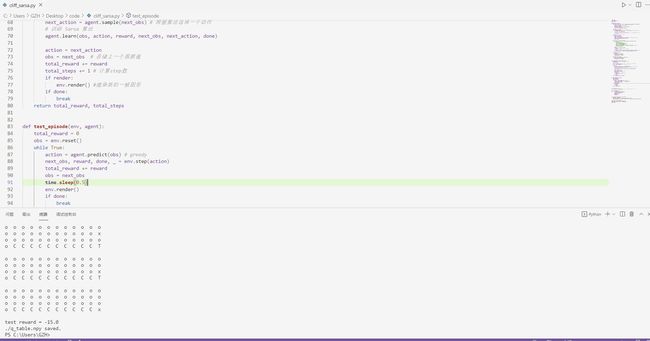【零基础强化学习】100行代码教你训练——基于SARSA的CliffWalking爬悬崖游戏
基于SARSA的CliffWalking爬悬崖游戏
- 写在前面
- show me code, no bb
- 结果展示
- SARSA与Q-learning
- 写在最后
-
- 谢谢点赞交流!(❁´◡`❁)
更多代码: gitee主页:https://gitee.com/GZHzzz
博客主页: CSDN:https://blog.csdn.net/gzhzzaa
写在前面
- 作为一个新手,写这个强化学习-基础知识专栏是想和大家分享一下自己强化学习的学习历程,希望大家互相交流一起进步!在我的gitee收集了强化学习经典论文:强化学习经典论文,搭建了基于pytorch的典型智能体模型,大家一起多篇多交流,互相学习啊!
show me code, no bb
import gym
import numpy as np
import time
class SarsaAgent(object):
def __init__(self, obs_n, act_n, learning_rate=0.01, gamma=0.9, e_greed=0.1):
self.act_n = act_n # 动作维度,有几个动作可选
self.lr = learning_rate # 学习率
self.gamma = gamma # reward的衰减率
self.epsilon = e_greed # 按一定概率随机选动作
self.Q = np.zeros((obs_n, act_n))
# 根据输入观察值,采样输出的动作值,带探索
def sample(self, obs):
if np.random.uniform(0, 1) < (1.0 - self.epsilon): #根据table的Q值选动作
action = self.predict(obs)
else:
action = np.random.choice(self.act_n) #有一定概率随机探索选取一个动作
return action
# 根据输入观察值,预测输出的动作值
def predict(self, obs):
Q_list = self.Q[obs, :]
maxQ = np.max(Q_list)
action_list = np.where(Q_list == maxQ)[0] # maxQ可能对应多个action
action = np.random.choice(action_list)
return action
# 学习方法,也就是更新Q-table的方法
def learn(self, obs, action, reward, next_obs, next_action, done):
""" on-policy
obs: 交互前的obs, s_t
action: 本次交互选择的action, a_t
reward: 本次动作获得的奖励r
next_obs: 本次交互后的obs, s_t+1
next_action: 根据当前Q表格, 针对next_obs会选择的动作, a_t+1
done: episode是否结束
"""
predict_Q = self.Q[obs, action]
if done:
target_Q = reward # 没有下一个状态了
else:
target_Q = reward + self.gamma * self.Q[next_obs, next_action] # Sarsa
self.Q[obs, action] += self.lr * (target_Q - predict_Q) # 修正q
# 保存Q表格数据到文件
def save(self):
npy_file = './q_table.npy'
np.save(npy_file, self.Q)
print(npy_file + ' saved.')
# 从文件中读取Q值到Q表格中
def restore(self, npy_file='./q_table.npy'):
self.Q = np.load(npy_file)
print(npy_file + ' loaded.')
def run_episode(env, agent, render=False):
total_steps = 0 # 记录每个episode走了多少step
total_reward = 0
obs = env.reset() # 重置环境, 重新开一局(即开始新的一个episode)
action = agent.sample(obs) # 根据算法选择一个动作
while True:
next_obs, reward, done, _ = env.step(action) # 与环境进行一个交互
next_action = agent.sample(next_obs) # 根据算法选择一个动作
# 训练 Sarsa 算法
agent.learn(obs, action, reward, next_obs, next_action, done)
action = next_action
obs = next_obs # 存储上一个观察值
total_reward += reward
total_steps += 1 # 计算step数
if render:
env.render() #渲染新的一帧图形
if done:
break
return total_reward, total_steps
def test_episode(env, agent):
total_reward = 0
obs = env.reset()
while True:
action = agent.predict(obs) # greedy
next_obs, reward, done, _ = env.step(action)
total_reward += reward
obs = next_obs
time.sleep(0.5)
env.render()
if done:
break
return total_reward
# 使用gym创建悬崖环境
env = gym.make("CliffWalking-v0") # 0 up, 1 right, 2 down, 3 left
# 创建一个agent实例,输入超参数
agent = SarsaAgent(
obs_n=env.observation_space.n,
act_n=env.action_space.n,
learning_rate=0.1,
gamma=0.9,
e_greed=0.1)
# 训练500个episode,打印每个episode的分数
for episode in range(500):
ep_reward, ep_steps = run_episode(env, agent, False)
print('Episode %s: steps = %s , reward = %.1f' % (episode, ep_steps, ep_reward))
# 全部训练结束,查看算法效果
test_reward = test_episode(env, agent)
print('test reward = %.1f' % (test_reward))
agent.save()
- 代码全部亲自跑过,你懂的!
结果展示
- S是起点,C是障碍,G是目标
- agent从S开始走,目标是找到到G的最短路径
- 每走一步的reward可以建模成-1,最终目标是让
累计奖励最大,也就是路径最短
- 代表智能体一步一步向前走!
- 可以看到智能体是远离障碍走的,显得有点
胆小
SARSA与Q-learning
- sarsa下一步的Q对应的action是经过贪婪-探索的实际与环境交互的动作(属于on-policy),加了探索的动作会对环境中reward比较低的状态很敏感,所以实验结果很胆小!
- q-learning下一步的Q对应的action是直接选取最大值,不是实际与环境交互的动作(属于off-policy),只选最大值的总动作意味着只关心高奖励的状态,低奖励影响不大,所以实验结果贴着障碍物走,很大胆!
- Q-learning的对比实验
写在最后
十年磨剑,与君共勉!
更多代码:gitee主页:https://gitee.com/GZHzzz
博客主页:CSDN:https://blog.csdn.net/gzhzzaa
- Fighting!
基于pytorch的经典模型:基于pytorch的典型智能体模型
强化学习经典论文:强化学习经典论文
![]()
while True:
Go life
![]()


